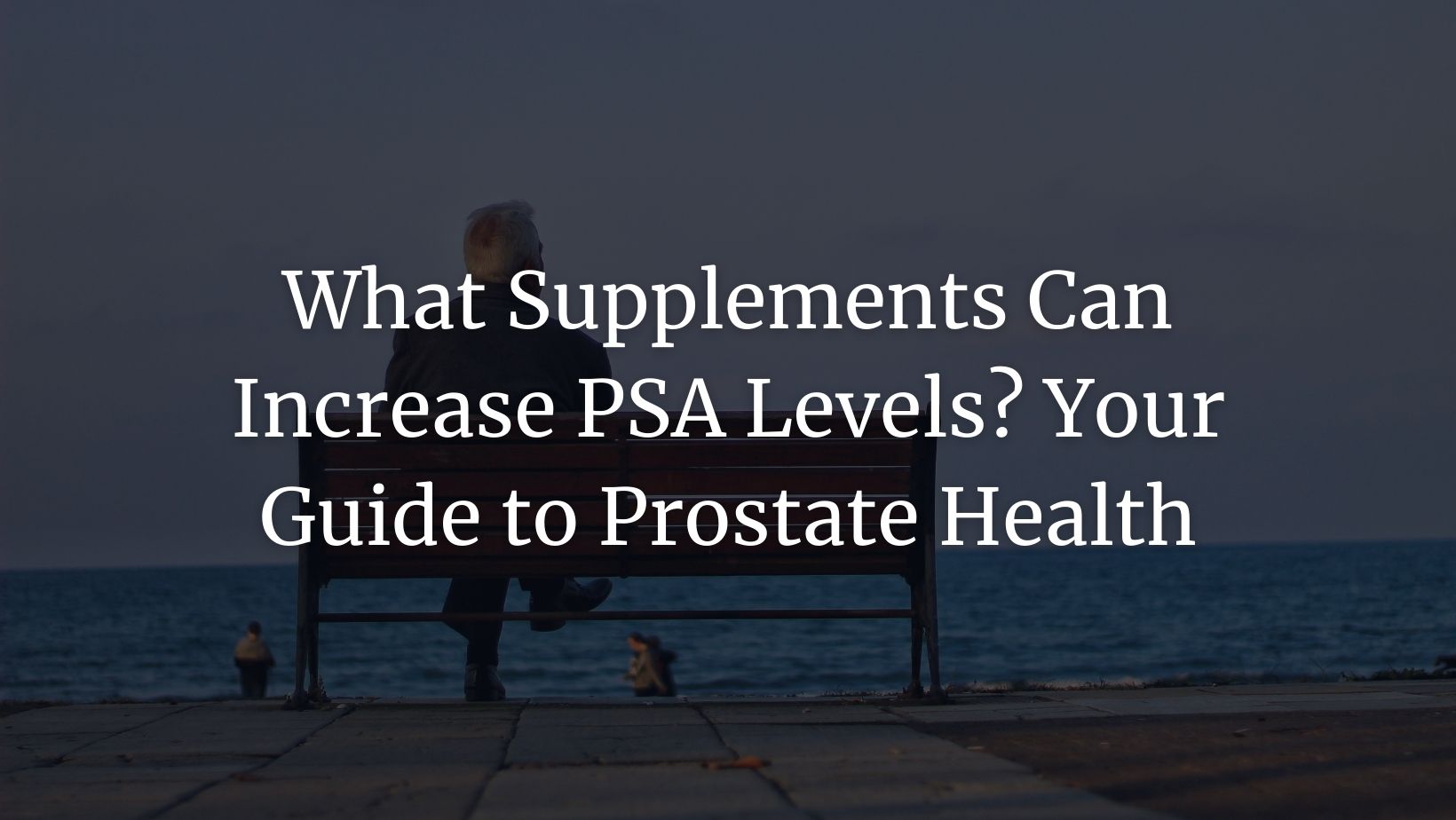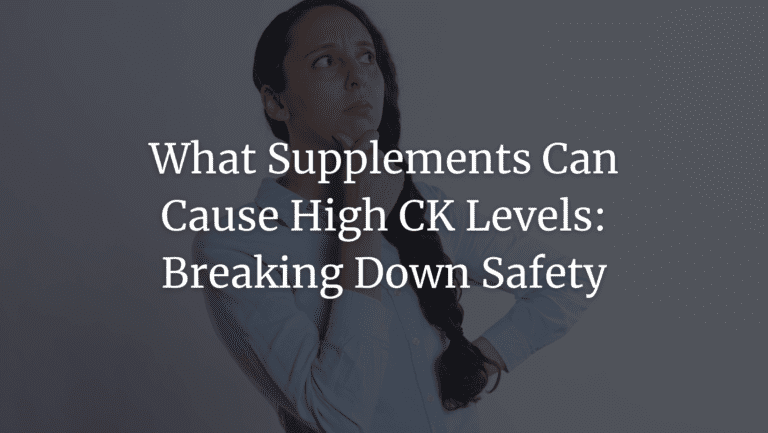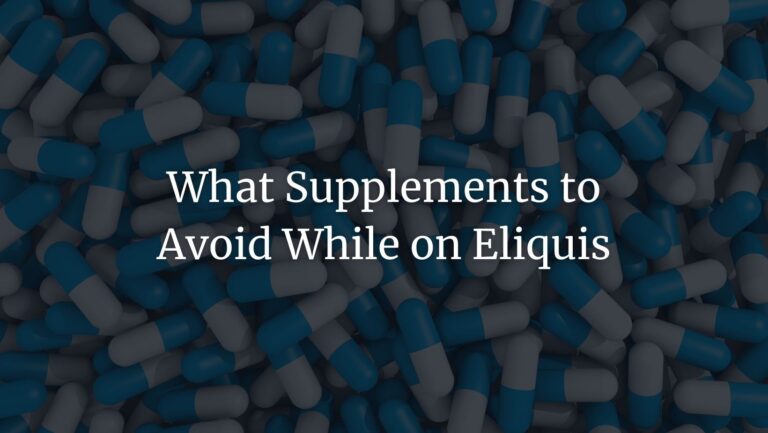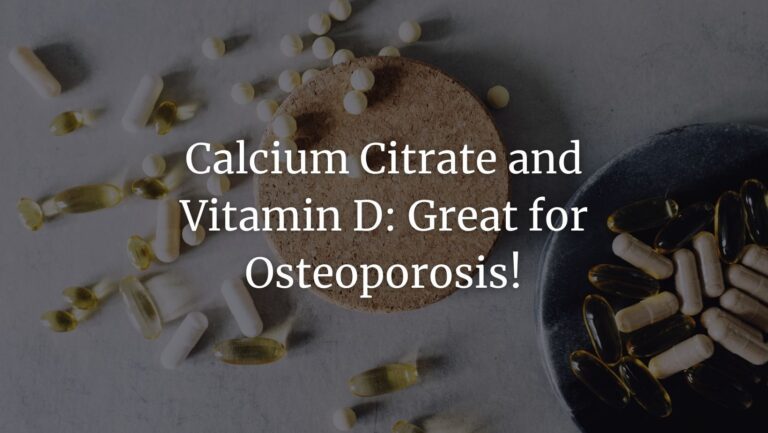What Supplements Can Increase PSA Levels? Your 2023 Guide
Prostate health is a significant concern for people around the world – and PSA levels are a key biomarker that your doctor might want to test. But what about the other aspects of health? If you’re taking any supplements for wellness, will they impact your PSA level? Should you ask your doctor about them – and should you worry if your Prostate-Specific Antigen (PSA) levels are elevated? This is what this article is here for.
Elevated PSA levels can be an indicator of potential prostate issues, making it crucial to understand the role of supplements in this context. In this article, we will cover everything you need to know about the link between PSA and supplements:
- What PSA levels are and their significance for your prostate health
- Supplements that can increase PSA levels, including testosterone boosters, Saw Palmetto, and more
- Potential benefits and risks associated with these supplements
- … and more
Our goal is to provide you with a well-rounded understanding of how these supplements may affect your PSA levels, allowing you to make informed decisions about your health. We will dive into each supplement’s specifics, discussing their potential effects, uses, and precautions to consider. By the end of this article, you will have a clearer understanding of the relationship between these supplements and PSA levels, empowering you to take charge of your prostate health.
Understanding PSA Levels


If you want to learn more about PSA levels and their significance, it’s essential to begin with a solid foundation.
PSA, or Prostate-Specific Antigen, is a protein produced by the prostate gland. Primarily found in semen, small amounts of PSA can also be detected in the blood. PSA levels serve as an important biomarker for assessing prostate health, and in some cases, they may indicate potential issues, such as prostate inflammation, enlargement, or even cancer. [1]
However, it’s crucial to note that elevated PSA levels don’t always point to a severe problem. In fact, several factors can influence PSA levels, and understanding these factors can help you make more informed decisions about your health. Some of the factors that can affect PSA levels include:
- Age: PSA levels tend to rise as men get older, which means an elevated level in an older man might be considered normal, while the same level in a younger man could be cause for concern.
- Prostate size: Men with larger prostates generally have higher PSA levels due to the increased volume of prostate tissue producing the antigen.
- Infection or inflammation: Prostatitis, or inflammation of the prostate gland, can lead to a temporary increase in PSA levels.
- Physical activity: Engaging in vigorous exercise or activities that put pressure on the prostate, such as cycling, may cause a temporary increase in PSA levels.
- Ejaculation: Sexual activity can cause a short-term increase in PSA levels. It is usually recommended to abstain from ejaculation for 24-48 hours before a PSA test.
- Certain medications: Some medications, including those used to treat urinary symptoms or hair loss, can lower PSA levels.
- When it comes to interpreting PSA levels, there is no universal “normal” value. Instead, healthcare professionals consider various factors, including age, prostate size, and medical history, to determine what might be considered a normal range for each individual. It’s essential to work closely with your healthcare provider to understand your PSA levels and monitor any changes over time.
In the next sections, we will discuss the role of supplements in influencing PSA levels, equipping you with the knowledge you need to make informed decisions about your prostate health. Remember, your well-being is our top priority, and we’re here to help guide you every step of the way.
Supplements and Their Impact on PSA Levels


As you continue your journey to better understand the relationship between supplements and PSA levels, it’s important to recognize the potential benefits and drawbacks of various supplements in the context of prostate health. In this section, we will discuss popular supplements that are commonly used to support various aspects of health, such as hormone balance, energy levels, and immune function. While these supplements may offer numerous benefits, they can also impact PSA levels, making it essential to evaluate their use carefully.
Let’s dive into each supplement, exploring their typical uses, potential benefits, and how they might influence PSA levels:
DHEA (Dehydroepiandrosterone)
DHEA is a hormone produced by the adrenal glands that serves as a precursor for the production of other hormones, such as testosterone and estrogen. People often use DHEA supplements to support hormone balance, improve energy levels, enhance mood, and promote healthy aging. There is an ongoing debate of how exactly DHEA impacts prostate health.
However, some research seems to point that DHEA supplementation can lead to increased PSA levels. [2] Some have even suspected that DHEA affects predominantly pre-cancerous cells – while others claim the opposite, and actually mention that low DHEA levels are linked with a higher PSA.
As the research continues, one thing is clear – DHEA clearly impacts prostate health and PSA levels.
If you are considering DHEA supplementation, it’s crucial to consult with your healthcare professional to determine the appropriate dosage and monitor your PSA levels. And, if you’ve been taking DHEA for a while, definitely let your doctor know about it.
Testosterone Boosters
Testosterone boosters are supplements designed to increase testosterone levels, a hormone crucial for muscle growth, strength, and sexual function. We already know that testosterone replacement can affect PSA levels [3] – and supplements might have a similar effect. Common ingredients in these supplements include tribulus terrestris, fenugreek, and D-aspartic acid. While these supplements may provide some benefits in performance and looks, especially for athletes and bodybuilders, they can also contribute to higher PSA levels. If you choose to use testosterone boosters, once again, consider getting PSA level checks on a regular basis and discuss any concerns with your healthcare provider.
Saw Palmetto
Saw palmetto is a popular herbal supplement derived from the fruit of the Serenoa repens plant. It has been traditionally used to support prostate health, and some studies have suggested that it may help reduce symptoms of an enlarged prostate, such as urinary frequency and urgency. However, there has been some speculation that saw palmetto can potentially increase PSA levels in some individuals. So far, the research seems to say saw palmetto doesn’t affect PSA [4], however, because it’s a PSA-influencing suspect it’s still important to let your doctor know if you’ve been taking it.
Can vitamin D raise PSA?
There is no conclusive evidence to suggest that vitamin D supplementation directly raises PSA levels [5]. In fact, some studies have shown that higher vitamin D levels are associated with lower PSA levels and a reduced risk of prostate cancer. [6] However, research in this area is still ongoing and not fully conclusive – so, don’t rush to the store for a vitamin D supplement based on these finding alone
In the upcoming sections, we will continue to discuss additional supplements, their potential benefits, and how they might impact PSA levels. Armed with this information, you will be better equipped to make informed decisions about your supplementation choices and overall prostate health.
The Importance of Discussing Herbal Supplements with Your Doctor


As we’ve explored the potential impact of various supplements on PSA levels, it’s crucial to emphasize the importance of discussing your herbal supplement use with your healthcare provider. Many people tend to overlook the significance of informing their doctor about the herbal supplements they take, assuming they are harmless due to their natural origin. However, it’s essential to remember that herbal supplements can interact with medications, influence test results, and even impact PSA levels.
One reason this communication is particularly important is the prevalence of combination supplements on the market. These products often contain a mixture of herbal ingredients, vitamins, and minerals, and their potential impact on PSA levels may not be immediately apparent. Some of these combination supplements have been reported to influence PSA levels, making it essential for you and your healthcare provider to be aware of their usage.
By informing your doctor about your herbal supplement use, you can ensure that your healthcare team has a complete and accurate picture of your health regimen. This information will enable them to provide more personalized care, identify potential interactions, and monitor your PSA levels more effectively.
Here are a few more reasons why discussing your herbal supplement use with your doctor is so important:
- Drug interactions: Herbal supplements can interact with medications, either enhancing or reducing their effects, which may lead to unintended consequences.
- Influence on test results: Some herbal supplements can impact test results, including PSA levels, which could lead to confusion or misinterpretation of results.
- Allergic reactions: Some individuals may experience allergic reactions or sensitivities to certain herbs, making it vital for healthcare providers to be aware of their usage.
- Dosing guidance: Your doctor can help you determine the appropriate dosage for your herbal supplements, ensuring that you receive the desired benefits without risking potential side effects.
Ultimately, communication is key. It’s crucial to be transparent with your healthcare provider about your herbal supplement use. This open communication will help you and your doctor work together to monitor your PSA levels, manage potential interactions, and make the best decisions for your overall prostate health.
Conclusion
While supplements can provide essential nutrients and support overall health, it is crucial to be aware of their potential impact on PSA levels. By working closely with your healthcare provider and monitoring your PSA levels regularly, you can make informed decisions about which supplements are appropriate for your specific needs.
Remember that supplements should never be used as a substitute for professional medical advice, diagnosis, or treatment. Always consult your healthcare provider before starting, stopping, or changing your supplement regimen, especially if you have a history of prostate issues or are at risk for prostate cancer.
FAQs
Can supplements raise your PSA level?
Yes, certain supplements can raise your PSA levels. As we’ve discussed earlier in the article, supplements like DHEA, testosterone boosters, saw palmetto, pregnenolone, and zinc have been reported to influence PSA levels in some individuals. It’s essential to discuss your supplement use with your healthcare provider and monitor your PSA levels regularly to ensure they remain within a healthy range.
What can artificially raise PSA levels?
Several factors can artificially raise PSA levels, causing temporary increases that may not necessarily indicate a problem with prostate health. These factors include:
Vigorous exercise or activities that put pressure on the prostate, such as cycling
Ejaculation, which can cause a short-term increase in PSA levels. It is usually recommended to abstain from ejaculation for 24-48 hours before a PSA test.
Prostatitis, or inflammation of the prostate gland, which can lead to a temporary increase in PSA levels
Certain medications, including some diuretics and medications that affect testosterone levels
What medications can raise PSA?
While some medications can lower PSA levels, others might cause an increase. Testosterone replacement therapy, for example, can raise PSA levels. It’s important to discuss your medications with your healthcare provider, as they can help you understand how they might impact your PSA levels and guide you in making the best decisions for your prostate health.
.
References
- Barry MJ. Clinical practice. Prostate-specific-antigen testing for early diagnosis of prostate cancer. New England Journal of Medicine 2001; 344(18):1373–1377
- Arnold JT. DHEA metabolism in prostate: For better or worse? Mol Cell Endocrinol. 2009 Mar 25;301(1-2):83-8. doi: 10.1016/j.mce.2008.10.019. Epub 2008 Nov 1. PMID: 19013497; PMCID: PMC2667103.
- Gore J, Rajfer J. Rising PSA during Testosterone Replacement Therapy. Rev Urol. 2004;6 Suppl 6(Suppl 6):S41-3. PMID: 16985913; PMCID: PMC1472885.
- Andriole GL, McCullum-Hill C, Sandhu GS, Crawford ED, Barry MJ, Cantor A; CAMUS Study Group. The effect of increasing doses of saw palmetto fruit extract on serum prostate specific antigen: analysis of the CAMUS randomized trial. J Urol. 2013 Feb;189(2):486-92. doi: 10.1016/j.juro.2012.09.037. Epub 2012 Dec 14. PMID: 23253958; PMCID: PMC3979451.
- Tóth Z, Szalay B, Gyarmati B, Jalal DA, Vásárhelyi B, Szabó T. Vitamin D Deficiency has no Impact on PSA Reference Ranges in a General University Hospital – A Retrospective Analysis. EJIFCC. 2020 Sep 29;31(3):225-230. PMID: 33061877; PMCID: PMC7545131.
- Xie DD, Chen YH, Xu S, Zhang C, Wang DM, Wang H, Chen L, Zhang ZH, Xia MZ, Xu DX, Yu DX. Low vitamin D status is associated with inflammation in patients with prostate cancer. Oncotarget. 2017 Mar 28;8(13):22076-22085. doi: 10.18632/oncotarget.16195. PMID: 28423553; PMCID: PMC5400647.



![What Is the Best Sulforaphane Supplement? [2023 In-Depth Guide]](https://supplementrex.com/wp-content/uploads/2023/06/6-768x433.jpg)



